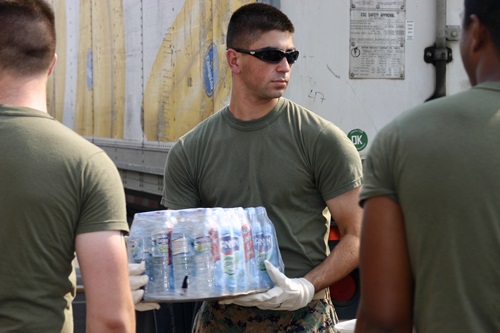
Hurricane Beryl came up from the Caribbean, tore into Texas and Louisiana and left a mess in her wake, including widespread destruction, loss of power and several deaths. Beryl was the earliest Category 5 hurricane on record in the Atlantic basin. The storm also brought numerous tornadoes and flooding through eastern Texas, into Arkansas and southeastern Missouri, with the storm then moving toward the Midwest and then New England.
Many are still digging out and although some flights are back in the air, sports have taken a back seat for the time being, a situation likely to continue for a while yet. The economic toll from the storm, according to Accuweather, is estimated to be between $28 and $32 billion (although this number could go higher).
People Magazine provided the following list of resources where donations will be accepted:
American Red Cross
Donate by visiting redcross.org, calling 1-800-RED-Cross (800-733-2767) or texting REDCROSS to 90999. Checks bearing “Hurricane Beryl” in the memo line (along with a completed donation form) can also be sent to Red Cross chapters.
Salvation Army
Visit helpsalvationarmy.org to fill out a donation form and check the option for Hurricane Beryl. One hundred percent of the donation will go to relief efforts. You can also call 1-800-SAL-ARMY.
Houston Food Bank
Food and monetary donations are accepted, and the organization is looking for volunteers. According to the Houston Chronicle, for each $1 donated, three meals will be provided due to the food bank’s alliance with 1,600 partners in the area.
 Memorial Assistance Ministries
Memorial Assistance Ministries
The organization’s Disaster Relief and Recovery Fund helps families receive assistance for needs including gas, clothes and rent assistance. Donate here.
Gulf Coast Regional Blood Center
The area is in urgent need of blood donations. Click here to schedule an appointment; remember that even if you are not in the area affected by the storm, blood banks nationwide are always in need of donations of every blood type. Click here to go to the American Red Cross blood donation website to learn more.
The United Nations World Food Program
The organization is accepting donations here.
Note Regarding Material Donations (Goods and Services): While many wish to directly donate clothing, cans of food, business services and more, disaster relief workers say those efforts are not what is needed at this time. NPR cautions that before donating, individuals should take the advice of Patricia McIlreavy, president and CEO of the Center for Disaster Philanthropy.
"This is not the time to be donating products or even services," McIlreavy says. "That's frequently the urge, and most often that is the wrong thing to do. ...With the floods blocking off streets, when warehouses are not available, there's no place for these products — there's no place to store anything, there's no place to distribute anything. And that's going to be the case for some time." (And with many major highways closed, and flights limited to affected areas, there are few ways to move material donations across the country.)
This article about items good-intentioned people donated unnecessarily (stuffed animals, half-used items from medicine cabinets, dilapidated shoes and even formal clothing) reinforces this message.
Instead, McIlreavy says, people should give money to groups they trust, and that have the ability to provide aid where it's needed most. Monetary donations are always preferable.
Please remember that the Better Business Bureau has advised caution when donating to upstart charities. So-called storm chasers looking to capitalize on the disaster may launch crowdfunding appeals, according to the BBB. Those who see a suspicious campaign can now report it to the BBB Scam Tracker, or to the Texas attorney general's hotline at 800-621-0508 or via e-mail at consumeremergency@nag.texas.gov.

